Contents
Introduction
Web3 is transforming how freelancers connect with opportunities, offering a new way to work that is more aligned with the principles of decentralization and transparency. In this evolving landscape, Web3 platforms are creating a borderless environment where freelancers can thrive, free from the constraints of traditional systems.
These platforms leverage blockchain technology to offer secure, trustless transactions, enabling freelancers to work with clients globally without the need for intermediaries. For those seeking to advance their freelance career, exploring Web3 platforms could be a game-changer.
Top 6 Web3 Freelance Platforms
In the rapidly evolving Web3 landscape, a number of freelance platforms have emerged, offering freelancers new ways to connect with opportunities while benefiting from the principles of decentralization, transparency, and blockchain technology. Below are six top Web3 freelance platforms that are making waves in the industry.
1. LaborX
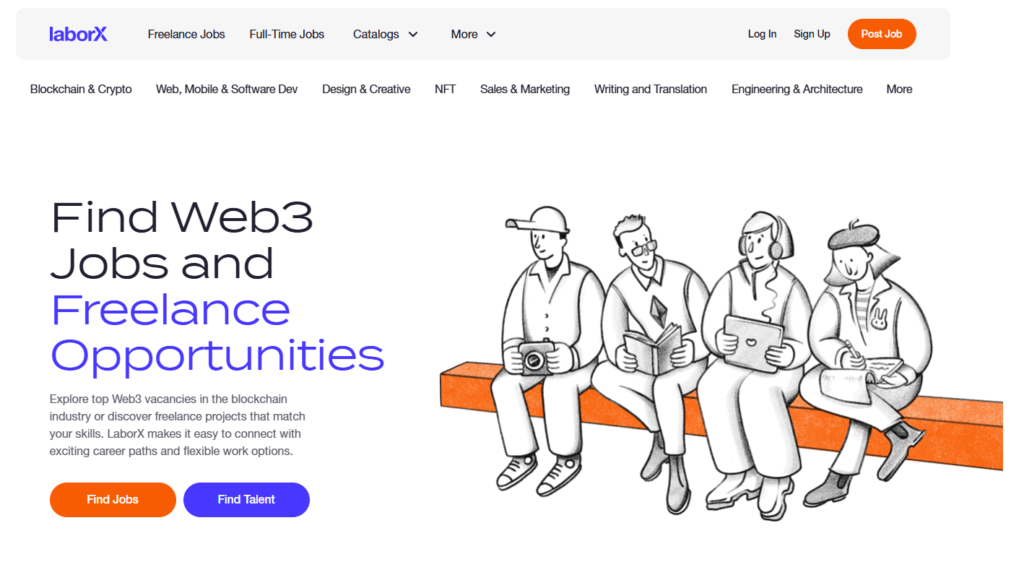
LaborX is a prominent platform in the Web3 space, recognized for its innovative approach to freelancing. It operates on the principles of decentralization, allowing freelancers to engage in work without the need for traditional intermediaries. One of the key features of LaborX is the use of cryptocurrency for payments, which enables secure, fast, and borderless transactions.
Additionally, the platform employs smart contracts to create job agreements, ensuring that all terms are clear, enforceable, and transparent. LaborX connects freelancers with global opportunities, making it a versatile platform for those seeking to expand their reach.
2. Thirdwork
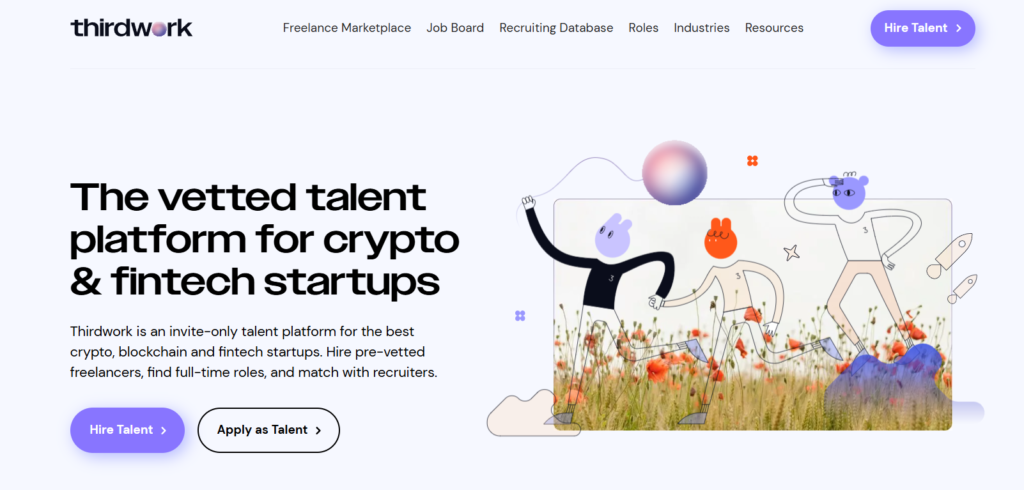
Thirdwork is designed specifically for crypto-native freelancers, catering to those who are deeply embedded in the Web3 ecosystem. The platform stands out by offering pre-vetted job opportunities, ensuring that freelancers can find work that aligns with their expertise and interests.
Thirdwork also emphasizes a rapid hiring process, which is ideal for freelancers looking to secure positions quickly. With roles across various Web3 domains, including blockchain development, DeFi, and NFT creation, Thirdwork provides a focused and efficient way for freelancers to connect with relevant projects.
3. Braintrust
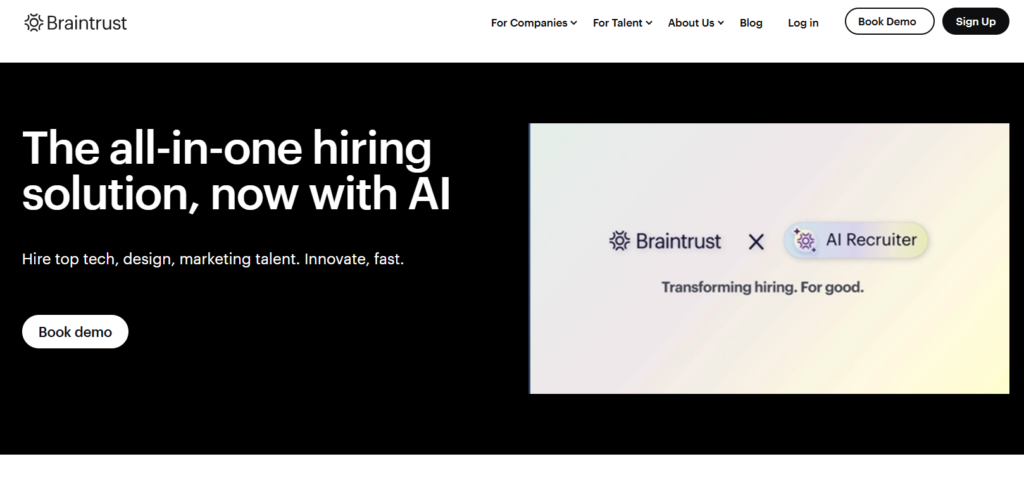
Braintrust introduces a unique model where freelancers are not just users, but co-owners of the platform. This cooperative approach allows freelancers to have a voice in the platform’s operations through governance tokens, which also reward active participation.
Unlike traditional freelance platforms that often charge fees, Braintrust offers its services to freelancers without any fees, making it a more lucrative option. This platform is particularly attractive for those who want to contribute to and benefit from the growth of a community-driven network.
4. Upwork for Web3
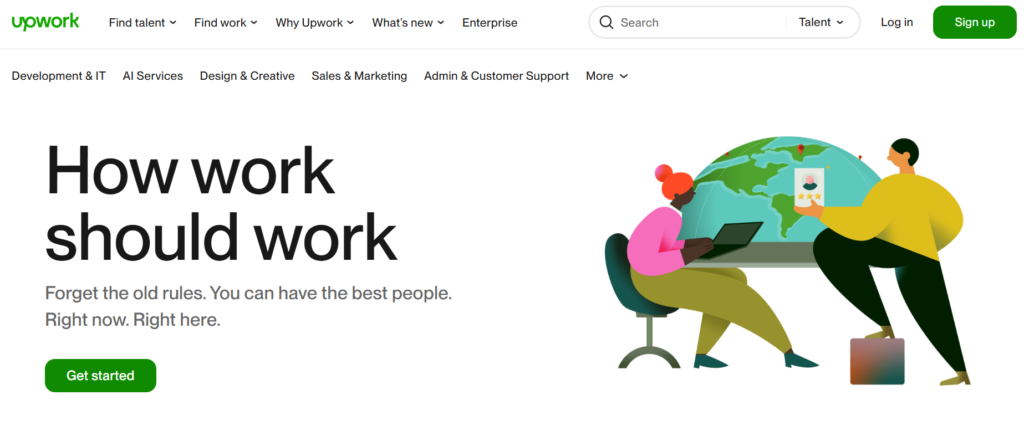
As one of the largest and most well-known freelance platforms, Upwork has ventured into the Web3 space by offering a broad range of opportunities tailored to this new digital landscape. Freelancers can find work in areas such as blockchain development, NFT creation, and other Web3-related projects.
Upwork’s entry into this space provides a familiar and trusted environment for freelancers who are new to Web3, while also offering the chance to engage with innovative projects and clients in the blockchain industry.
5. DeWork
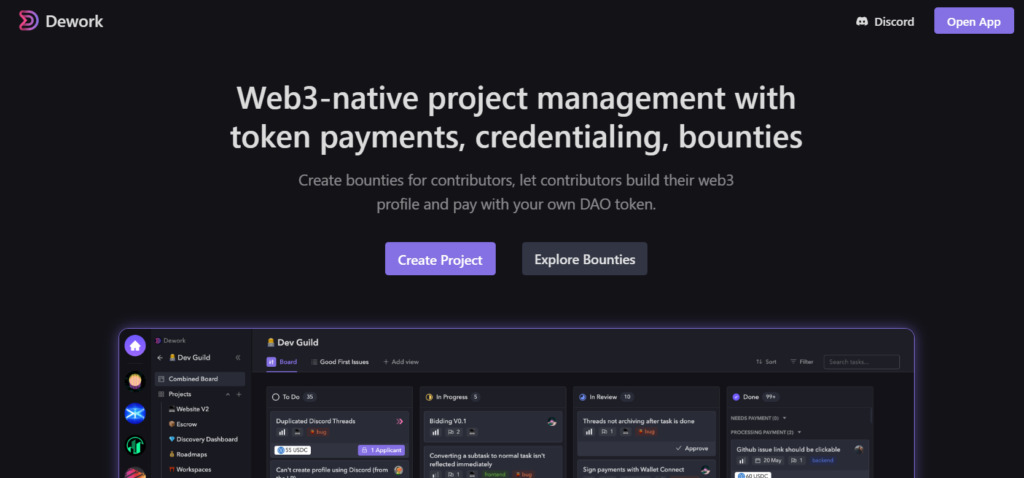
DeWork is a platform that focuses on connecting freelancers with decentralized autonomous organizations (DAOs). These organizations are a key component of the Web3 ecosystem, operating without centralized control and allowing members to participate in decision-making processes.
DeWork enables freelancers to contribute to DAO projects, offering opportunities that are both innovative and aligned with the principles of decentralization. This platform is ideal for those who are interested in working within decentralized structures and contributing to cutting-edge Web3 initiatives.
6. Designity

Designity offers a collaborative model that is particularly suited for creative professionals in the Web3 space. The platform blends the security and stability of traditional employment with the flexibility of freelancing, allowing creatives to work on Web3 projects while enjoying the benefits of a supportive community. Designity’s approach ensures that freelancers can focus on their creative work while still benefiting from the innovative opportunities that the Web3 world has to offer.
These six platforms represent some of the best options available for freelancers looking to enter or expand their presence in the Web3 space. Each platform offers unique benefits, making them suitable for different types of freelancers depending on their needs and interests.
The Rise of Web3 Freelance Platforms
Web3 freelance platforms stand apart from traditional ones by operating on decentralized networks, which remove the need for intermediaries like agencies or centralized platforms. Unlike traditional platforms that control fees, policies, and payments, Web3 platforms empower freelancers with greater control over their work and earnings.
One of the main benefits of Web3 platforms is decentralized governance, where decisions are made collectively by the community rather than by a single entity. This allows for a more transparent and fair system that aligns with the interests of freelancers.
Another significant advantage is the use of cryptocurrency for payments. With cryptocurrencies, freelancers can receive payments almost instantly, regardless of geographical boundaries, and avoid high transaction fees associated with traditional banking. This also adds a layer of financial privacy and autonomy.
Enhanced security is another hallmark of Web3 platforms. By utilizing blockchain technology, these platforms ensure that transactions and contracts are immutable and transparent, reducing the risk of fraud and disputes. For freelancers, this means a more secure and trustworthy environment to work in.
Advantages of Using Web3 Freelance Platforms
Web3 freelance platforms are redefining the way freelancers interact with clients and manage their work. Unlike traditional platforms that often involve middlemen, high fees, and sometimes opaque processes, Web3 platforms are built on the principles of decentralization and transparency.
This new approach offers freelancers more control, better financial outcomes, and a global reach that was previously challenging to achieve. Below are some of the key advantages that make Web3 freelance platforms a compelling choice for modern freelancers.
Transparent Payments
One of the most significant benefits of Web3 platforms is the transparency they bring to financial transactions. Traditional freelance platforms often involve multiple intermediaries who can delay payments and charge high fees. In contrast, Web3 platforms utilize cryptocurrency, which allows for direct payments between freelancers and clients.
These transactions are secured by blockchain technology, ensuring that payments are not only instant but also fully transparent and traceable. This eliminates the common issues of hidden fees or payment delays, allowing freelancers to have a clear understanding of their earnings. Moreover, the reduced transaction fees associated with cryptocurrency payments mean that freelancers take home more of what they earn, making this a financially attractive option.
Global Reach
Web3 platforms are inherently global, removing the barriers that often limit freelancers to specific regions or markets. By operating on decentralized networks, these platforms allow freelancers to connect with clients from all over the world without the need for intermediaries or complicated processes.
This global reach enables freelancers to tap into a broader range of opportunities, working with clients across different time zones and industries. The ability to engage with a diverse clientele not only enhances the variety of projects available but also increases the potential for higher earnings and professional growth.
Ownership and Participation
Another unique aspect of Web3 freelance platforms is the opportunity for freelancers to have a stake in the platforms they use. Many Web3 platforms are designed with decentralized governance models, where users can participate in decision-making processes. This often comes in the form of governance tokens or other incentives that reward active participation.
As stakeholders, freelancers have a direct influence on the development and policies of the platform, aligning the platform’s growth with their own interests. This sense of ownership fosters a stronger community and provides an additional layer of engagement that traditional platforms typically do not offer.
Challenges to Consider
While Web3 freelance platforms offer many advantages, they also come with certain challenges that freelancers should be aware of. These challenges stem primarily from the inherent complexities of operating within a decentralized, blockchain-based environment. Understanding these potential hurdles can help freelancers navigate the Web3 space more effectively and make informed decisions about their work.
Market Volatility
One of the most significant challenges in the Web3 space is the volatility of cryptocurrencies. Since payments on these platforms are typically made in cryptocurrency, fluctuations in the value of these digital assets can have a direct impact on a freelancer’s earnings. For instance, a payment received in a cryptocurrency like Bitcoin or Ethereum might decrease in value before it can be converted to a stable currency, leading to potential losses.
On the flip side, there’s also the possibility of gains if the value of the cryptocurrency increases. This volatility requires freelancers to be mindful of market conditions and consider strategies like converting payments quickly or using stablecoins to mitigate the risk of value fluctuations.
Regulatory Concerns
Navigating the legal and tax implications in the decentralized space of Web3 can also be challenging. The regulatory environment for cryptocurrencies and blockchain-based platforms is still evolving, and it varies significantly from one country to another. Freelancers may face uncertainties regarding how their earnings are taxed, what legal obligations they have, and how to comply with local and international regulations.
This complexity is compounded by the decentralized nature of Web3, where traditional financial regulations may not always apply or be clear. Freelancers must stay informed about the latest developments in cryptocurrency regulations and consider seeking professional advice to ensure they are meeting their legal and tax obligations properly.
Tips for Success on Web3 Freelance Platforms
Succeeding on Web3 freelance platforms requires a combination of specific skills, proactive engagement, and a commitment to staying current with the ever-evolving blockchain landscape. Here are some essential tips to help you thrive in this new digital economy.
1. Building a Strong Portfolio
A well-crafted portfolio is crucial for attracting clients on Web3 platforms. Since blockchain technology and decentralized projects are still relatively new, showcasing relevant skills and experience can set you apart from the competition. Include examples of past work that demonstrate your proficiency in blockchain-related tasks, such as smart contract development, crypto payments, or NFT creation.
Highlighting your involvement in successful Web3 projects or your ability to navigate decentralized systems will make your portfolio more compelling. This not only helps potential clients see your expertise but also builds trust, which is essential in the decentralized world.
2. Networking within Web3 Communities
Networking plays a vital role in finding opportunities and building connections in the Web3 space. Engaging with online communities, such as forums, Discord groups, or Twitter spaces dedicated to blockchain and decentralized projects, can open doors to new projects and collaborations.
These communities are often the first places where new web3 job opportunities are posted, and being an active participant can help you stay ahead of the curve. Additionally, building relationships within these networks can lead to long-term collaborations and referrals, further enhancing your prospects on Web3 platforms.
3. Continuous Learning
The Web3 space is dynamic, with new technologies, platforms, and trends emerging regularly. To remain competitive, it’s essential to continuously update your knowledge and skills. This might involve learning new programming languages relevant to blockchain development, understanding the latest trends in decentralized finance (DeFi), or familiarizing yourself with emerging Web3 tools and platforms.
Staying informed not only makes you more valuable to clients but also ensures that you can adapt to changes in the industry. Consider following influential figures in the Web3 space, participating in webinars, or taking courses to keep your skills sharp and relevant.
Conclusion
Web3 freelance platforms are opening up new possibilities for freelancers who are ready to embrace the future of work. From LaborX’s crypto payments and smart contracts to Braintrust’s unique model of freelancer ownership, these platforms offer a diverse range of opportunities that cater to different needs and skills. Whether you’re looking to work with decentralized autonomous organizations through DeWork or seeking creative collaborations on Designity, the Web3 landscape has something for everyone.
Embracing Web3 can truly be a game-changer for freelancers. The decentralized nature of these platforms provides more control, transparency, and flexibility, allowing freelancers to work in an environment that aligns with their values and ambitions. By stepping into the Web3 space, freelancers not only gain access to innovative projects and global clients but also become part of a rapidly growing ecosystem that is reshaping the future of work. For those willing to adapt and grow with this new technology, the possibilities are endless.
